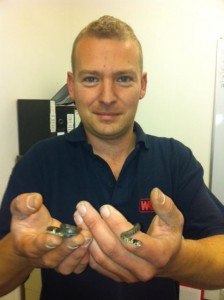Waste King, the specialist collections, clearance and recycling company, is becoming used to rescuing distressed livestock as part of its day-to-day activities. It has now added two grass snakes to its list which began, in August 2011, with ‘Colin’ a Giant African Land Snail.
In the last few weeks, while helping a Watford-based customer clear garden rubbish, Waste King’s operatives came across two grass snakes – which had chosen to hibernate in the grass clippings and leaves that were being removed. Not wishing to force the snakes to face the winter’s chill without a cosy home in which to hibernate, Waste King carefully collected the snakes. They are now being cared for in a suitable garden in the locality which is ‘grass snake friendly’.
“It’s great that this story has a happy ending,” said Waste King’s operations director, Andy Cattigan. “It seems that, in addition to being collections, clearance and recycling specialists, Waste King is also developing a specialism in helping to safeguard various creatures’ futures. It’s all part of a day’s work for our Environment Agency-licensed staff.”
The grass snake (Natrix natrix), sometimes called the ringed snake or water snake, is a Eurasian non-venomous snake. It is often found near water and feeds almost exclusively on amphibians.
Reaching nearly two metres in length, grass snakes are the UK’s largest reptile and our only snake which lays eggs. A grass snake’s speed and wariness makes it incredibly difficult to spot but, once cornered, it is one of the few animals that play dead as a defence against predators. If this ploy fails, a foul-smelling substance from the anus and repeated head strikes are employed to aid the escape. Grass snakes are active predators themselves of frogs, toads, fish, small mammals and birds. Common and widespread in Europe, grass snakes are usually to be found near water where there is plenty of shelter and warm morning sunshine in which to bask. They hibernate during the cooler winter months.
Waste King’s managing director, Glenn Currie, explained: “In August last year, one of our customers was moving to the USA and so had to get rid of her pet Giant African Land Snail. We were helping her dispose of her unwanted possessions prior to the move and she asked us to take the snail as well.”
Not wishing to see a repeat of the ‘cat in a green wheelie bin’ story which had hit the headlines some time previously, Waste King operatives took pity on the giant mollusc. They brought it back to Waste King’s Hemel Hempstead headquarters and named it ‘Colin’. Then, having read about Colin – in a local newspaper – Sophie Dowling, a teacher at St Cuthbert Mayne School, in Hemel Hempstead, asked if her school could ‘borrow’ the snail to help the children in her class study habitats and learn about taking care of the environment including learning how to take care of other creatures. Waste King agreed and Colin is now a much loved character at the school.
Comment: Snakes and snails may not be what Waste King’s founders had in mind when they began their business to ‘do something positive for the environment’ but it does illustrate the inter-dependence of life forms on this planet. It also emphasises the importance of caring for the environment so that everyone and everything benefits.







Leave A Comment
You must be logged in to post a comment.